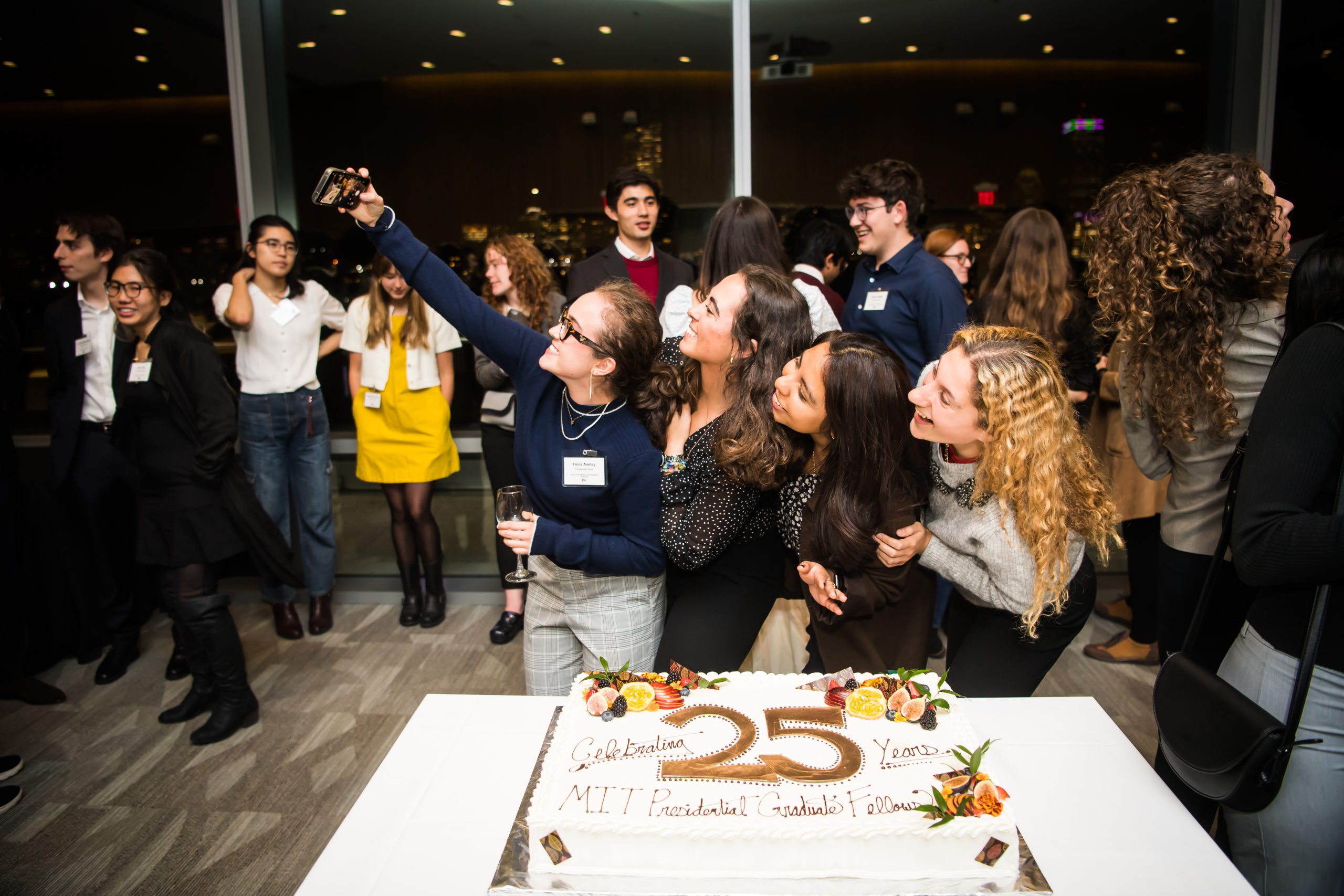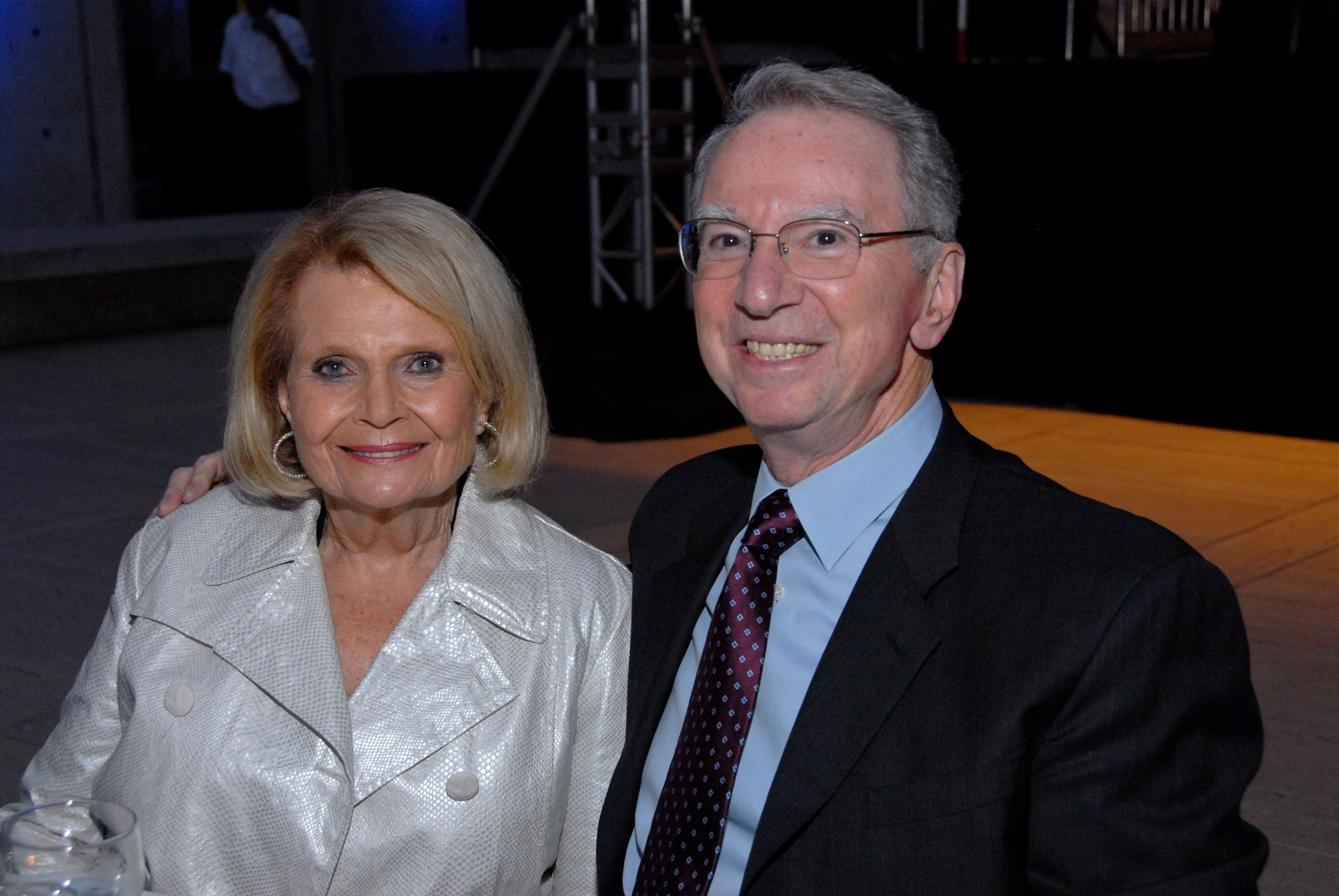
MIT Presidential Fellows celebrate the 25th anniversary of the program in October 2024.
PHOTO: JOSEPH LEE
“I often think of the whalers and the people who bought the boats and supported them as being our very earliest entrepreneurs and risk-takers,” says Jacobs, retired founder of the pioneering digital wireless communications firm Qualcomm. “Buy the boat, stock it with food, get the crew, and they go out for three years and may never return.”
By endowing the Irwin Mark Jacobs and Joan Klein Jacobs Presidential Fellowships in the Department of Electrical Engineering and Computer Science (EECS), he and his late wife, Joan, have helped scores of MIT graduate students embark on their own voyages of discovery.
“I benefited from scholarships and fellowships going through school,” Jacobs says in a recent Zoom call from his home in La Jolla, California. “When we were in a position to do so, we decided we should support others the same way.”
The Jacobs Presidential Fellowships form a key part of the larger MIT Presidential Fellowship Program, which recently marked its 25th anniversary. Administered by the Office of the Provost, the MIT Presidential Fellowships support between 110 and 125 graduate students each year, covering tuition and assisting with living expenses for their first academic year at MIT.
In 2007, Irwin and Joan Jacobs established the Presidential Fellowships in EECS, the department from which Irwin Jacobs received his master’s and doctoral degrees and where he taught from 1959 to 1966. In 2025, Irwin made a meaningful gift to endow the program in perpetuity, ensuring that between 18 and 20 students in EECS will be supported annually.
Principles of Communication Engineering, the book Jacobs coauthored in 1965 with the late EECS professor John Wozencraft, was regarded for more than 20 years as the definitive text in communications theory and remains widely used today.
“I’m enormously grateful to Irwin and Joan for supporting this program and allowing us to bring so many outstanding graduate students to MIT,” says MIT President Sally Kornbluth. “The Presidential Fellowship Program in EECS offers graduate students incredible opportunities to explore, discover, and make an impact, from the moment they arrive at the Institute. As Jacobs Fellows, they enrich the MIT community with their curiosity, creativity and boldness—and then go on to share their brilliance with the world.”

“Your investment in my education has been life-changing”
Over the years, Jacobs and his wife regularly traveled back to campus to meet with fellowship recipients. “It reminds you how quickly technology and science are moving ahead,” he says, recalling discussions with the grad students about their innovative work. “The new ways of thinking about things were always very illuminating.”
Ashley Goodnight, a PhD student in the 2024-2025 cohort of Jacobs Presidential Fellows, studies under the supervision of Tomás Palacios, the Clarence J. Lebel Professor of Electrical Engineering and Computer Science.
Goodnight is researching gallium nitride, a novel material that can withstand temperatures exceeding 500 degrees Celsius and could prove valuable for electronics powering exploratory rovers on the surface of Venus.
“They say that first steps are often the hardest, and being chosen as an Irwin Mark Jacobs and Joan Klein Jacobs Presidential Fellow gave me the financial freedom and flexibility to evaluate my options in choosing labs and projects during this transitional period of my life,” she wrote in a letter of appreciation sent to Jacobs this past spring. “Your investment in my education has been life-changing, and I am extremely grateful.”
Leila Shea Hudson, also a member the 2024–2025 cohort of Jacobs Presidential Fellows, is a PhD student in the Physical Optics and Electronics Group headed by Rajeev Ram, the Clarence J. LeBel Professor in Electrical Engineering and Computer Science.
Hudson’s research focuses on sensing hydrogen, a gas that serves as an efficient energy carrier, but also odorless and flammable. “Sensitive leak detection in industries that use hydrogen as an energy source is critically important,” said Hudson, who in her spare time speed skates and is a substitute harpist for the Boston Philharmonic Orchestra.
“The Jacobs Presidential Fellowship has allowed me to conduct research without the immediate need for funding from my advisor,” she continued. “I have had more resources available to purchase equipment and build the setups required for my research project. I am extremely grateful to have received such a fellowship.”
PhD student Jiaming Tang, studying under Song Han, associate professor of electrical engineering and computer science, was also a Jacobs Presidential Fellow in 2024–2025. “At MIT, I focus on developing systems that make AI faster, more efficient, and more accessible,” Tang said. “By optimizing performance and reducing costs, we can unlock powerful tools for more people and solve problems at a greater scale.
“It’s incredibly motivating to be part of a community that shares this innovative spirit,” he said.
“The Jacobs Presidential Fellows program has had a remarkable impact on the Department of Electrical Engineering and Computer Science, on MIT, and on the more than 250 students who have received this prestigious award,” says W. Eric L. Grimson PhD ’80, chancellor for academic advancement, interim vice president for resource development, and the Bernard M. Gordon Professor of Medical Engineering. “The fellowship supports students in their first year of PhD studies, enabling them to begin their careers in academic research without fear of losing funding. Having had the pleasure of knowing and working with Irwin and Joan for many years and having taught and advised many of the Jacobs Presidential Fellows, I can say it’s clear this program is a win-win for all involved.”
“These ideas spring up—and off they go”
Irwin and Joan Jacobs have been renowned for their philanthropy spanning education, health care, science, and the arts. At Joan’s passing in 2024, the couple donated significantly to various causes, primarily in the San Diego area and at their undergraduate alma mater, Cornell University.
Jacobs has led fifth graders from his old grammar school in New Bedford on field trips to MIT for tours of the Koch Institute and the Edgerton Center—and for liquid nitrogen ice cream.
At MIT, when Jacobs gave the 2005 Commencement address, he and his wife established the Joan and Irwin M. Jacobs Professorship. It is currently held by Nickolai Zeldovich ’02, MNG ’02, a professor in EECS whose research interests include building practical secure systems.
Jacobs sees support for MIT, and higher education in general, as critical. “Much of our economy, and the world’s, depends on the technological innovations that come out of US universities like MIT and are built upon in private industry,” he says.
“MIT is foremost in encouraging the students to think about new things and giving them the opportunity to work on them. Then these ideas spring up—and off they go.”